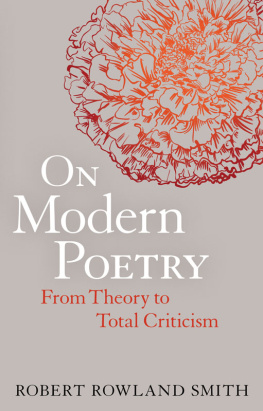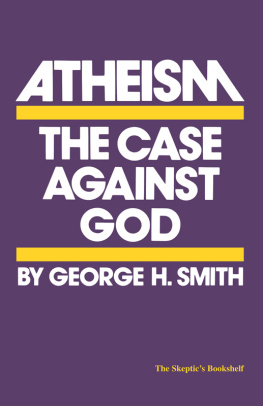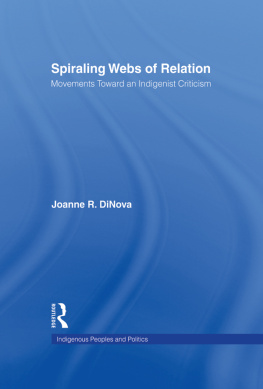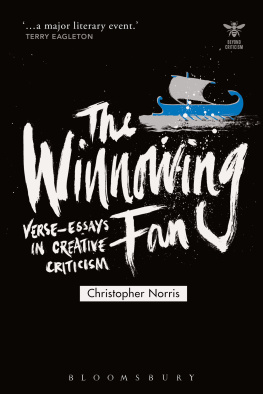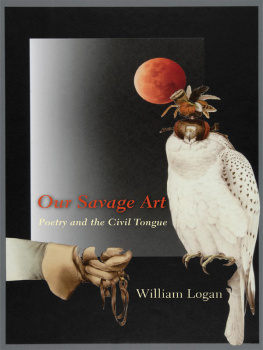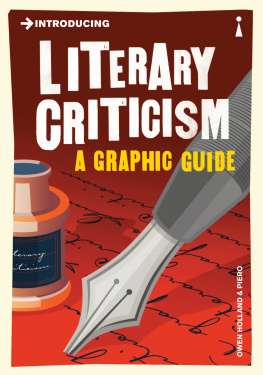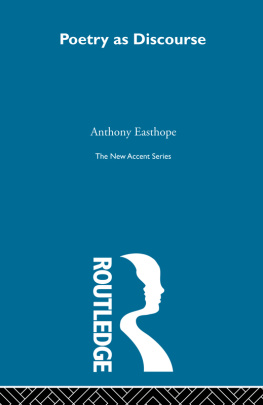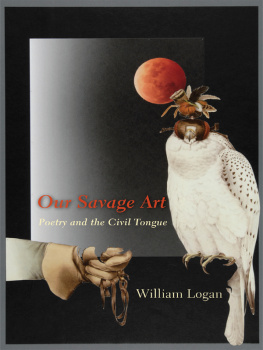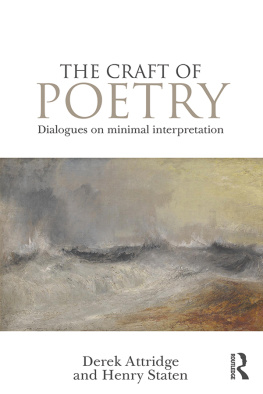Smith - On modern poetry : from theory to total criticism
Here you can read online Smith - On modern poetry : from theory to total criticism full text of the book (entire story) in english for free. Download pdf and epub, get meaning, cover and reviews about this ebook. City: London, New York, year: 2012, publisher: Bloomsbury Academic;Continuum, genre: Romance novel. Description of the work, (preface) as well as reviews are available. Best literature library LitArk.com created for fans of good reading and offers a wide selection of genres:
Romance novel
Science fiction
Adventure
Detective
Science
History
Home and family
Prose
Art
Politics
Computer
Non-fiction
Religion
Business
Children
Humor
Choose a favorite category and find really read worthwhile books. Enjoy immersion in the world of imagination, feel the emotions of the characters or learn something new for yourself, make an fascinating discovery.
- Book:On modern poetry : from theory to total criticism
- Author:
- Publisher:Bloomsbury Academic;Continuum
- Genre:
- Year:2012
- City:London, New York
- Rating:3 / 5
- Favourites:Add to favourites
- Your mark:
- 60
- 1
- 2
- 3
- 4
- 5
On modern poetry : from theory to total criticism: summary, description and annotation
We offer to read an annotation, description, summary or preface (depends on what the author of the book "On modern poetry : from theory to total criticism" wrote himself). If you haven't found the necessary information about the book — write in the comments, we will try to find it.
Smith: author's other books
Who wrote On modern poetry : from theory to total criticism? Find out the surname, the name of the author of the book and a list of all author's works by series.
On modern poetry : from theory to total criticism — read online for free the complete book (whole text) full work
Below is the text of the book, divided by pages. System saving the place of the last page read, allows you to conveniently read the book "On modern poetry : from theory to total criticism" online for free, without having to search again every time where you left off. Put a bookmark, and you can go to the page where you finished reading at any time.
Font size:
Interval:
Bookmark:
ALSO AVAILABLE FROM CONTINUUM
Literary Theory: A Guide for the Perplexed, Mary Klages
Literature, In Theory, Julian Wolfreys
Poetry Toolkit: The Essential Guide to Studying Poetry, Rhian Williams
On Modern Poetry
From theory to total criticism
Robert Rowland Smith

Continuum International Publishing Group
The Tower Building 11 York Road London SE1 7NX | 80 Maiden Lane Suite 704 New York NY 10038 |
www.continuumbooks.com
Robert Rowland Smith Ltd. 2012
All rights reserved. No part of this publication may be reproduced or transmitted in any form or by any means, electronic or mechanical, including photocopying, recording, or any information storage or retrieval system, without prior permission in writing from the publishers.
Robert Rowland Smith has asserted his right under the Copyright, Designs and Patents Act, 1988, to be identified as Author of this work.
British Library Cataloguing-in-Publication Data
A catalogue record for this book is available from the British Library.
ISBN: 978-1-4411-4852-0
Library of Congress Cataloging-in-Publication Data
Smith, Robert Rowland.
On modern poetry : from theory to total criticism / Robert Rowland Smith.
p. cm.
Includes bibliographical references and index.
ISBN 978-1-4411-6572-5 (hardcover : alk. paper) -- ISBN 978-1-4411-7422-2 (pbk. : alk. paper) -- ISBN 978-1-4411-4976-3 (ebook pdf) -- ISBN 978-1-4411-4852-0 (ebook epub)
1. Poetry, Modern--20th century--History and criticism--Theory, etc. 2. Modernism (Literature) I. Title.
PN1271.O5 2012
809.1'04--dc23
2011046644
Typeset by Fakenham Prepress Solutions, Fakenham, Norfolk NR21 8NN
To Antonioni, il mellor fabbro
It must
Be the finding of a satisfaction, and may
Be of a man skating, a woman dancing, a woman
Combing. The poem of the act of the mind.
FROM WALLACE STEVENS, OF MODERN POETRY
CONTENTS
For kind permission to quote from works to which they own the rights, I thank the following: Barque Press; Columbia University Press; Curtis Brown; David Higham Associates; Faber and Faber; Marion Boyars Publishers; New Directions; Oxford University Press on behalf of The British Province of the Society of Jesus; Penguin Books; University of Chicago Press; Yale University Press.
This book, though in its present form a distant relation of them, has its origin in lectures I gave in the 1990s during my Prize Fellowship at All Souls College, Oxford. Thanks to those who participated. More recently, Ive had helpful feedback from Clare Birchall, and David Avital at Continuum has provided useful support. My inspiration has come from Tim Clark, Anthony Mellors, Jan Piggott, Jeremy Prynne, Denise Riley, Nick Royle and Ann Wordsworth; and among the dead from Paul de Man, Jacques Derrida, William Empson and Walter Pater. Chapeau!
Below is a Seamus Heaney poem, published in 2010 by Faber and Faber:
A Mite-Box
But still in your cupped palms to feel
The chunk and clink of an alms-collecting mite-box,
Full to its slotted lid with copper coins,
Pennies and halfpennies donated for
The foreign missions Made from a cardboard kit,
Wedge-roofed like a little oratory
And yours to tote as you made the rounds,
Indulged on every doorstep, each donation
Accounted for by a pinprick in a card
A way for all to see a way to heaven,
The same as when a pinholed Camera
Obscura unblinds the sun eclipsed.
There is the poem. What is one supposed to do with it? Already we have a deal of information to sift, and not just in the verses themselves. For reasons that go beyond scholarly diligence, I have provided author, date and publisher: these too are avenues in.
Apart from anything else, the name Seamus Heaney is a brand that says leading poet, professor, wise owl, institution, lyricist, Irishman, mainstream, successful, naturalist, human, warm, sensuous, avuncular, skilled, artisanal, earthy. Had I left the name out, you, the reader, might have felt more tentative reading the poem, assuming you didnt already know who wrote it. But the name gave you, however fleetingly or subliminally, a promise of what to expect. In so doing, it will have either increased or decreased your alertness to the text or both. Increased, because the work of a publicly endorsed poet is more likely to command your attention. Decreased, because the guarantee of quality invisibly engraved in such a name can blind ones critical faculties.
Either way, the connotations that come with the name Seamus Heaney suggest that modern poetry might not be so modern after all: they are far too reassuring. True, A Mite-Box doesnt rhyme, the metre is irregular, its two sentences are not properly finished, and Heaney has dropped a neologism, unblinds, into the last line, but any modernity it can claim lies mainly in its date (2010). Published nearly a century after The Waste Land, it is no further down the track of poetic innovation. On the contrary, it lags some way behind T. S. Eliots radical tableau of disjointed voices. In the vernacular, you might call it quite a traditional poem. In my terms, it is a pre-modernist modern poem, implying that modern poetry is a complex genre, if a genre at all.
Yet Heaney is published by Eliots own publisher, Faber and Faber. Not just publisher: Eliot was closely involved with Faber the business as an employee, and later a director; Eliots widow, Valerie, was to become a key shareholder. The names Eliot and Faber are as intertwined commercially as they are editorially. Thanks not least to Eliot money, derived from sales, and the Eliot name, Faber was able to establish itself as a leading poetry publisher in the UK and wider territories. When we talk about modern poetry, we are often signalling Faber poets, Heaney included. Considering Eliots poetic legacy, the fact that Faber has tended subsequently to favour pre-modernist works not just Heaney, but, say, Ted Hughes is therefore a little ironic.
Not that Faber doesnt continue to publish Eliot himself or Ezra Pound, but on the whole Faber has become more conservative and, given its influence on the poetry market, so has that market. The conservatism isnt necessarily bad: it answers a demand for accessible poetry in schools, for example. Ted Hughes can be taught in a way that Ezra Pound cannot. Though verse by Hughes carries a share of literary allusion, it is nothing compared with the profusion of reference in Pound, a poet who is either saved for university or, as is increasingly the case, ignored. Better that schoolchildren be put on a pre-modernist modern diet than be put off altogether.
So modern poetry, the subject of this book, contains at least two strains of modern, as manifested in the two sides of Faber: one modernist like Eliot, the other pre-modernist like Heaney. Putting dates on it is arbitrary. Common practice will often use modern to mean 1900 onwards, but I extend it back almost another hundred years to Keats, on the grounds that his poetry is about as far back as todays reader can go without starting to encounter diction that is challenging simply on account of its age. Even Keats, of course, can be difficult on these grounds. One tends to think of modernism as a decisive break with everything before it, but plenty of twentieth-century poetry continued to draw its inspiration from Tennyson or Hardy, say. My rule isnt hard and fast, but one consequence is that modernity keeps moving forward, even as genres such as modernism remain tagged to specific writers at specific dates.
Next pageFont size:
Interval:
Bookmark:
Similar books «On modern poetry : from theory to total criticism»
Look at similar books to On modern poetry : from theory to total criticism. We have selected literature similar in name and meaning in the hope of providing readers with more options to find new, interesting, not yet read works.
Discussion, reviews of the book On modern poetry : from theory to total criticism and just readers' own opinions. Leave your comments, write what you think about the work, its meaning or the main characters. Specify what exactly you liked and what you didn't like, and why you think so.

